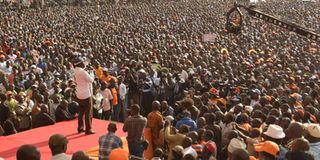I will eat my shoes if BBI report mirrors Saba Saba heroes’ dream

Opposition leader Raila Odinga addressing a Saba Saba Rally in Kamukunji grounds, Nairobi in 2017. PHOTO | FILE | NATION MEDIA GROUP
What you need to know:
- In fact, successive governments have tended to treat the multi-party campaign heroes as non-persons.
President Kenyatta II mirrors his father in having scant regard for those whose sacrifices created the opportunity for his rise to power.
Today is Saba Saba, the seventh day of the seventh month. On this day 30 years ago, the struggle for freedom from one-party dictatorship was ignited by a brutal crackdown.
Key proponents of the campaign for a democratic society were picked up by President Daniel arap Moi’s dreaded ‘securitate’ and hurled into the dungeons. Some of those who managed to escape the dragnet had to flee into exile.
An unknown number of young men who had dared the regime by heeding the call to converge on Kamukunji grounds, Nairobi, were killed and maimed by trigger-happy police.
SECOND LIBERATION
If the former Kenyatta Day (now Mashujaa Day) commemorated the struggle for independence from colonial rule, Saba Saba should surely serve as the celebration of the struggle for the Second Liberation.
It is instructive that Mashujaa Day marks October 20, 1952, the day colonial forces launched Operation Jock Scott with the declaration of a State of Emergency, arrest of Jomo Kenyatta and other nationalist leaders and brutal movement restrictions and mass arrests of nearly an entire populace in the regions that were bedrocks of the Mau Mau insurgency.
Saba Saba 1990 saw a government in independent Kenya borrow the colonial regime playbook. Kenneth Matiba, Raila Odinga, Charles Rubia and many others were thrown into detention without trial in a vain effort to halt the freedom march.
It is a pity that those who led the fight have never been properly recognised.
Even though Kenyatta Day was renamed Mashujaa Day, elevating it from glorification of one individual to recognition for all national heroes, the celebrations pay scant attention to the Second Liberation stalwarts.
CRITICAL TIME
In fact, successive governments have tended to treat the multi-party campaign heroes as non-persons. Maybe some of the leaders are consumed by guilt that, at the critical time when Kenyans came out to say no to tyranny and dictatorship, they stood on the wrong side of history.
A parallel can probably be traced back to Independence, when President Kenyatta I betrayed the nationalist cause with formation of a government that became simply an extension of the colonial state.
He promoted a class of black bourgeoisie to inherit the shoes, lands and business holding of the departing colonists, to the exclusion of their own people.
President Kenyatta II mirrors his father in having scant regard for those whose sacrifices created the opportunity for his rise to power.
Despite attempts at revisionist history, there is little evidence of his playing any meaningful role in the struggle for freedom and justice.
It is also evident that his Mashujaa Day speeches and dishing out of national awards place Saba Saba heroes nowhere in his mind.
It did seem, however, that in teaming up with Opposition chief Raila Odinga in March 2018 to launch the Building Bridges Initiative, President Uhuru Kenyatta may have recognised some major oversight and sought to make amends.
EQUITABLE SOCIETY
BBI was advertised as a route towards a free, just and equitable society we never attained with Independence in 1963, return of multi-party democracy in 1992 and enactment of the current Constitution in 2010. Unfortunately, it became dominated by elite power-sharing goals.
Just a week ago, the BBI secretariat felt constrained to respond to ‘the flood of false reports’ on contents of the final report.
The complaint did not point out the specific falsehoods. Instead, it employed language and logic borrowed directly from the mouths of our politicians, charging that ‘the intention of such false reports is to divide Kenyans and to seek to capitalise on such divisions; they come from the very culture that Kenyans are looking to cure through this process”.
It is such accusations which display the culture we are seeking to move away from. It would actually have been more useful to point out what specifically was false and provide the correct picture. After all, falsehoods are best countered with truth.
I would be willing to bet my last cent that the reports being denied are largely true and accurate.
The BBI team says they have completed their report and are only waiting for the opportune moment to present it to President Kenyatta and Mr Odinga. That itself is very revealing. BBI is supposed to be owned by the people of Kenya, not its chief sponsors.
I have little confidence in the final report being much of an improvement on the tepid document released last November.
Should the BBI team pull a surprise and produce a report that meets the aspirations of those who laid down their lives for Independence and Saba Saba, I will eat my shoes.
[email protected] www.gaitho.co.ke @MachariaGaitho





